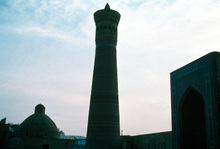| dc.coverage.spatial | Site: Bukhara (Uzbekistan) | en_US |
| dc.coverage.temporal | creation date: 1127-1129 | en_US |
| dc.creator | Unknown | en_US |
| dc.date | 1127-1129 | en_US |
| dc.date.accessioned | 2010-06-03T14:35:34Z | |
| dc.date.available | 2010-06-03T14:35:34Z | |
| dc.date.issued | 1127-1129 | en_US |
| dc.identifier | 144089 | en_US |
| dc.identifier.uri | http://hdl.handle.net/1721.3/53508 | en_US |
| dc.description | Rising 46 meters (150ft), the Kalyan minaret is the most prominent visual landmark within the city of Bukhara. Erected as part of a twelfth century mosque later replaced by the existing Kalyan mosque, the baked brick construction forms a thick, tapering cylindrical shaft capped by a rotunda with 16 arches. A multi-tiered muqarnas cornice crowns the entire structure. Baked brickwork decorates the shaft in bands of various, unrepeated patterns.
The minaret was not only used for the call to prayer, but also as a watchtower during periods of war. Tradition also relates that the condemned were in earlier times sentenced to a death on the stones beneath the minaret, after a fall from its heights. | en_US |
| dc.description | general view, 1987 | en_US |
| dc.format.extent | height: 46 m, diameter: 9 m | en_US |
| dc.format.medium | brick | en_US |
| dc.relation.ispartof | 114109 | en_US |
| dc.rights | (c) Roya Marefat 1987 | en_US |
| dc.subject | Mosques | en_US |
| dc.subject | Minarets | en_US |
| dc.subject | Madrasahs | en_US |
| dc.subject | Islamic religious education | en_US |
| dc.subject | Architecture, Islamic--Asia, Central | en_US |
| dc.subject | Architecture, Islamic --Uzbekistan | en_US |
| dc.title | Kalyan Minaret | en_US |
| dc.title.alternative | Kalan Minaret | en_US |
| dc.title.alternative | Tower of Death | en_US |
| dc.type | Image | en_US |
| dc.rights.access | All rights reserved | en_US |
| dc.identifier.vendorcode | A350 | en_US |
| vra.culturalContext | Central Asian | en_US |
| vra.culturalContext | Islamic | en_US |
| vra.culturalContext | Uzbek | en_US |
| vra.technique | construction | en_US |
| vra.worktype | Minaret | en_US |
| dc.contributor.display | Central Asian, Islamic, Uzbek | en_US |


